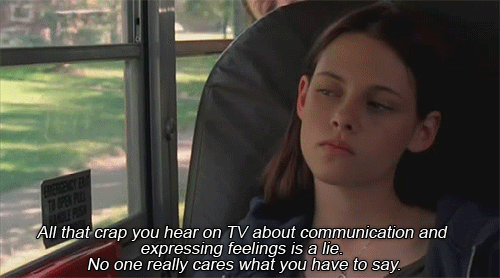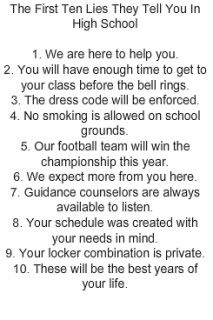1. In Mr. Neck’s Social Studies
class, they have a debate on whether or not America should have closed her
borders in 1900. Do you think the
tone of the lesson was, “Racist, intolerant, and xenophobic” just as David did?
Yes, I strongly feel the
take Mr. Neck took on the subject was extremely rude and intolerant. Mr. Neck is obviously not for immigration. He goes on
about how newly-American citizens don’t deserve to live on their hard earned
land and steal jobs from his son. However, that’s so much the issue of the
matter as when he starts to punish students who are righteously standing up for
what they believe in (pro-immigration), and rewarding those who take “his
side.” That personally disgusts me that he’d take advantage of his power that
way.
2.
Do you think the conflict
between Melinda’s parents has an effect on her behavior?
Yes, I definitely think
all the arguing between Mel’s parents has an impact on the way she acts. She
often talks about how with her dad, its best to not say anything. This probably
contributed to the fact she no longer speaks to pretty well anybody.
Furthermore, Melinda’s parents often neglect her and her needs because they are
so absorbed in their arguments. This negligence probably makes her feel unloved
and alone, which has an effect on her negative outlook on life.
3.
Do Melinda’s parents treat each
other as equals? Give an example from the text to support your answer.
No, Melinda’s father is
the dominant partner in the relationship, and shows complete disrespect towards
Mel’s hard-working mother. For example, during thanksgiving, Melinda’s mom
cooks a proper, traditional meal. Meanwhile, her dad is complaining about the
cooking and once Mel’s mom is gone for a work emergency, her dad gets takes
over, uses an axe to chop the turkey, and ruins it, also ruining the holidays
for Melinda’s mom who’s trying to keep the family together.
4.
Melinda is not a very likeable girl in the eyes of her peers and parents. Despite Melinda's negative outlook on life, what's something you admire about her character.
Because the novel is in a first person point of view, meaning we know what Melinda is thinking, feeling, and etcetera. To other characters in the
novel, Melinda probably seems like an extremely boring, freaky-girl. Meanwhile, we hear all her quirky, clever, funny comments like, “Never has a
bird been tortured so much to provide such a lousy dinner.” Melinda can be very witty, even charming, which I love about her. It’s a shame her parents and peers don't see this bright side of her.
5.
Melinda uses the bones from her
thanksgiving turkey to make a sculpture in art class. She jabs knives and forks
into it and sets a doll head inside its body. How does this symbolise the
conflict in Melinda’s life?
This work of art
represents pain. The bones in which the doll is trapped in could easily
symbolise how Melinda keeps everything inside, bottled up, while the sharp
utensils are all the things hurting her, such as her “big secret,” her
lonesomeness, her bad grades, her family problems, and etcetera.
6.
Why do you think the author
included a paragraph where Melinda looked back on her childhood memory of when
she went apple picking with her family?
First of all, the background
information helps develop a character, and I’m sure pretty most readers are
able to connect to this experience. Most of all, I think the author included it
to show us that this is not the “real” Melinda, and she was not always
depressed or alone. It helps us to understand that this dark phase Melinda was
caused by something, she wasn’t born this way.
7.
Do you think Melinda’s mother
and father are fit to be good parents?
At this point in the
novel, I’m not convinced Mel’s parents are fit to take care of her. First of
all, on Boxing Day, her mom makes her work at the store even though she’s
underage. We see the same kind of thing happen when she’s sealing envelopes at
her dad’s office, while he talks with his friends and gets mad at her for “how
many envelopes she bled on.”
8.
Give an example of a situation in this section of the novel, that contributes to an overall idea or theme of the novel.
When Melinda is asked to
help coach the boys basketball team in turn for extra credit (an A), after having showcased her free-throw ability, she decides
to not care and to show up. This situation is just one
of many where Melinda doesn’t put any effort into anything. She does not care
about her grades, and she has so much talent, but she’s not living up to her
full potential. This really aggravates me because once again, Mel shouldn’t be
complaining about her grades nor her lack of friendships if she’s not trying to
get anywhere.
9.
Heather is clearly not a good
friend to Melinda and always puts herself first. Why do you think Melinda, the
girl that doesn’t care, puts up with it?
If feel that even though
Melinda puts on the “freaky girl” face and acts like she can take things, just
like everyone, she wants to be liked and not alone. I also thing Melinda feels pressured
to stay friends with Heather because she can’t say no. Heather is great at
pulling her into things, and using her, which again, shows Heather’s true,
selfish character.
10.
How do you feel about Heather' modeling job. Is it age appropriate?
During Heather's swimsuit shoot, the photographer is saying things like, “Sexy,
very sexy, think beach, think boys.” Furthermore, afterwards she talks about
losing weight and starts eating next to nothing. This disgusts me. I don’t think
a fourteen year old girl should be told to look “sexy.” Furthermore, I think the pressure
put on her to lose weight is just as bad. I wish I could say it’s just
fiction, however the truth is, this is happening right now, everywhere. Society is
constantly pushing women to be thin, gorgeous, and etcetera. I’m glad the
author addressed this issue. Anderson has even further demonstrated the disrespect women
are given through the way Mel's father treats her mother, and the testy relationship the have.











